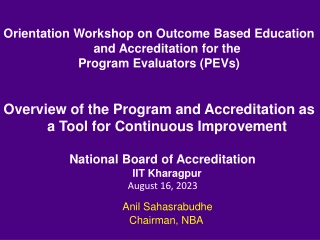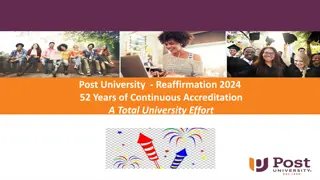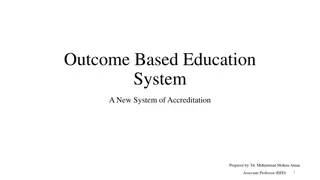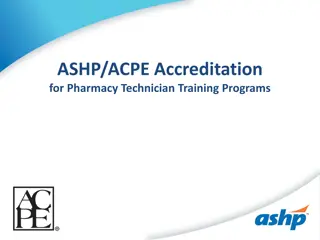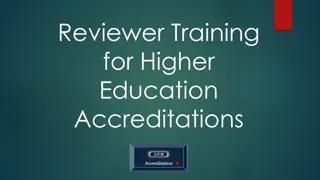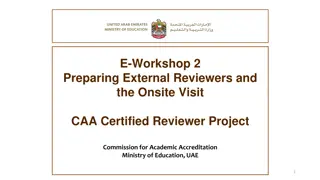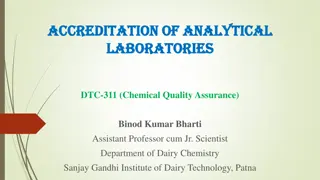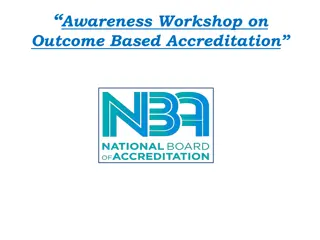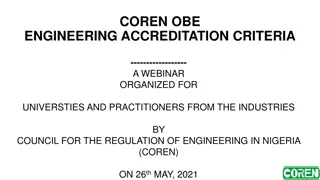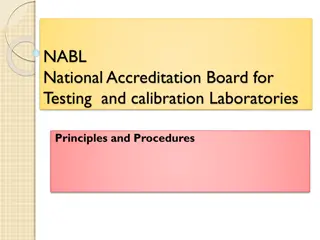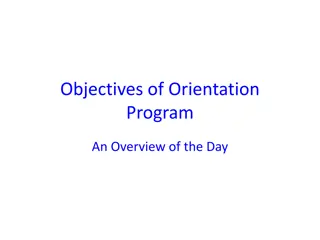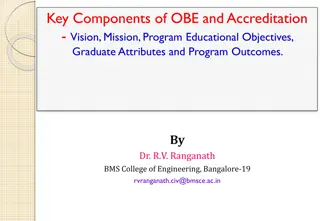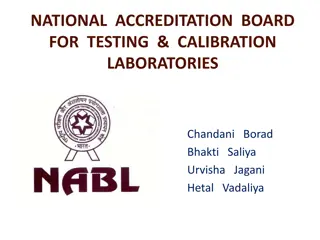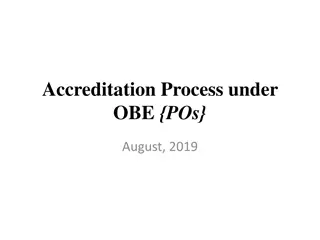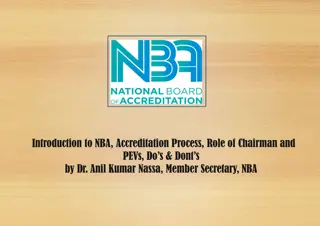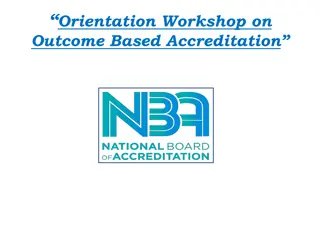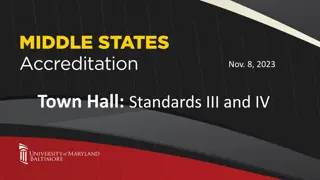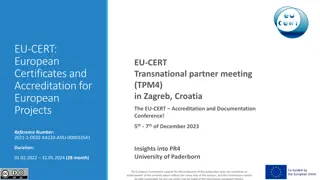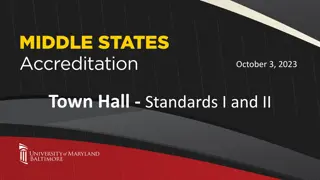Role and Responsibilities of Chairman in Outcome-Based Accreditation Workshops
In outcome-based accreditation workshops, the Chairman plays a crucial role in leading evaluation teams, chairing meetings, harmonizing team comments, and ensuring adherence to visit schedules. They verify institutional records, conduct stakeholder meetings, finalize evaluation reports, and conduct exit meetings with heads of institutions. The Chairman's responsibilities include facilitating discussions, preparing questions, and presenting strengths and weaknesses confidentially. They oversee the accreditation process and provide institutes with the opportunity to continue or withdraw applications.
Download Presentation

Please find below an Image/Link to download the presentation.
The content on the website is provided AS IS for your information and personal use only. It may not be sold, licensed, or shared on other websites without obtaining consent from the author. Download presentation by click this link. If you encounter any issues during the download, it is possible that the publisher has removed the file from their server.
E N D
Presentation Transcript
Orientation Workshop on Outcome Based Accreditation
Role & Responsibilities of Chairman Team Leader/Chairman: Lead the evaluation team Chair Team meetings Chair Exit meeting Spokes person for the Team Harmonise comments from team members while preparing report Collate Team inputs from review of Self-Study- Report and request clarification or further information
Role & Responsibilities of Chairman Team Leader: Conduct a pre-visit meeting with all evaluators on day zero of the visit Initiates discussion on the observations made after going through SAR in the pre-visit meeting Prepares questions to be raised and information to be obtained from the institution/department a list of documents to be verified, Collects pre-visit report from each evaluator Ensures adherence of visit schedule Contd....
Verifies institutional record regarding constitution of GC, Proceedings, Finance, List of faculty members, non-teaching staff, their salaries, safety and security related matters etc Conducts a meeting of all the experts in the evening for sharing their observations during the day and also preparing additional list of documents/evidences to be obtained. Chairs meetings with the stakeholders in the institute Conducts a meeting in the evening of second day and complete the evaluation process and finalize the report based on the evidences collected, interaction with stakeholders and reliable documents produced Sign and be responsible for evaluation report Contd....
Conducts exit meeting on day three with head of the institution Ensures no discussion on the findings of the outcome of accreditation Presents orally strengths and weaknesses of common facilities in the colleges while experts present details of the respective program strengths and weaknesses All confidential and not to be leaked at any place under any situation other aspects of the outcomes of visit are Provides a chance to the institute to continue with the accreditation process or withdraw the application for any program(s) In case of withdrawal, ensures that it is given in writing by the head of the institution there itself.
Desirable Attributes of Chairman Good professional standing Expertise in subject matter and/or accreditation system & process Professional approach Leadership skills Communication skills Listening in particular
Role & Responsibilities of PEV Team Members, including Chairman Evaluate programme together with Team Leader Familiar with accreditation system in general Well-versed with accreditation criteria Good understanding of outcomes-based system and assessment Go through self study report Thorough evaluation of criteria and outcomes Professional approach, unbiased, free of conflict of interest Committed full-time during accreditation visit, focused
Attributes of Program Evaluators Enthusiastic volunteer Technically competent Well-regarded Effective communication Listening skill Interpersonal skill Team-oriented Professional approach Courteous Time management Organized
Conflict of interest Definition of possible conflict of interest: have financial or personal interest in the university/institution; or have or have had a close, active association with the programme or faculty/school in the university/institution. Close or active association are, for example: Employment, as staff or consultant; Attendance, as student at the faculty/school; Receipt of honorary degree from the faculty/school; Membership of a board of the university or any committee advising on the programme being accredited.
What the PEVs looks for? PEVs are sent to evaluate programs, certifying that they satisfy the criteria stipulated They look for evidences that the required criteria are met They identify strengths, concerns, weaknesses and deficiencies
During Campus Visit Discuss issues of concern Interview Dean, HOD, management team, faculty, alumni and students to assess: Morale, attitudes and motivation Institutional and industry support Theoretical and practical aspects of curriculum Review of examination papers, student reports, instruction materials Exit meeting present program strengths and weaknesses
Major focus during visit Quality assurance processes, including internal reviews Entry standards for admission of students Qualifications, enthusiasm, workload of faculty Facilities Industry participation Title of a programme as shown on graduate s certificate and transcript
DONTs Don t keep on talking most of the time Don t waste time listening to presentation of information already well-documented (e.g. in self-study report) Don t give solutions/advices to problems identified no need to tell how you would have run the program Don t compare with your own institution /program Don t group diverse stakeholders in a joint feedback session, e.g. employers, alumni and parents all together
DONTs Don t group HOD, senior Professors and junior staff in a single session for faculty feedback Don t engage in non-accreditation activities during the campus visit Don t be aloof, abusive but should be assertive at times Don t be overly fault-finding adopt a balanced assessment of strengths and weaknesses
DONTs Don t engage in bean-counting rather look at the bigger picture & the outcomes Don t examine all thoroughly sufficient samples are good enough Don t engage in conflict-of-interest activities
Guidelines The evenings of the visiting team are deliberately kept free of activities to enable the team to complete the writing of the report. It is extremely important to note that the visiting team members do not indicate to the institution whether they would accredit or not accredit the programme and that the report is strictly confidential. After the conclusion of the exit meeting, all contacts of the institution should be through NBA only. If Institution contacts the team members, they should be advised to contact NBA.
Assessment by the Experts and the Chairperson should be holistic and fair. Each cell shall be filled with any one observation Y for compliance, C for concern, W for weakness and D for deficiency and should be consistent with corresponding points awarded. Finding must be filled in ink in each and every cell in Program Evaluation Worksheet. If there is any crossing, the same must be counter signed by both the experts. Avoid subjectivity in awarding marks as far as possible.
NBA makes travel arrangement for the team members including accommodation and travel to or from the campus where the program is delivered authorized travel agencies. through the NBA requires every team member to exhibit the highest standard of professionalism, honesty and integrity. ET members must be objective and truthful in reports, statement and testimony.
ET member must strictly adhere to visit schedule. ET members must avoid socializing event during the accreditation visit. ET members shall not solicit/accept gratuities from the institutions. The visit should be conducted in a very polite and cordial atmosphere. The behavior and attitude must not be authoritative and humiliating for the Institute.


